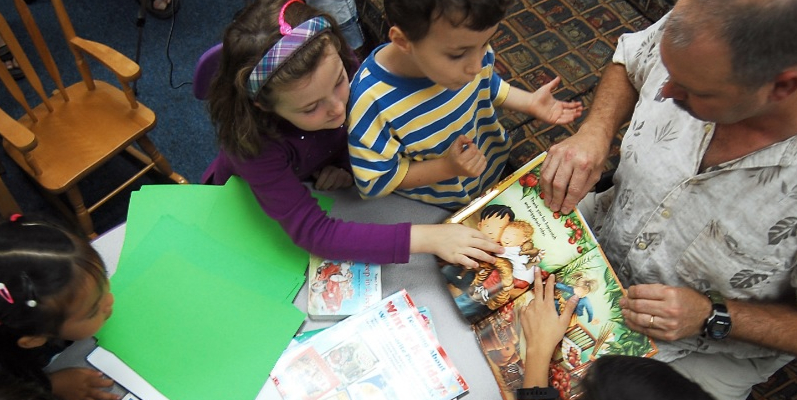Years ago, I was part of a group trained in my district to be a Curriculum Facilitator. That’s a fancy title for the person who represented their campus at district curriculum writing meetings. My title meant that I wrote curriculum with a team of other teachers based on input from the teachers I represented from my campus.
In our first training, the facilitator put an empty chair at the front of the room and asked us to visualize a student sitting in that chair. Each time the work became difficult or our conversations veered off course or we felt the task was too overwhelming, we were to “see” the student in the chair and then imagine how we’d explain to them why we weren’t able to move forward with designing curriculum meant to benefit them.
At one point, someone on our committee expressed that the work of writing curriculum was too time consuming. The facilitator said, “So you’re saying then that this work is, after all, all about us?” Everyone in the room fell silent. When it was said in that way, it was clear that the focus was not on the work and how difficult it was, but the curriculum writing process was, in fact, all about providing a quality learning experience for all our students.
Managing Expectations
It seems simple, but it’s not. We all start our teaching profession with particular ideas about how the experience will unfold and I’m willing to bet that most of us are quick to realize we’ve been a little too optimistic. Scenes from popular inspiring teacher movies fill our minds and then the reality of the day to day sets in. It’s easy to get discouraged and feel that we’re not making a difference in the lives of the kids we teach.
This is normal and teachers know that each year we fight the doldrums that plague us from October to February. What I’m talking about is much more pervasive than the four-month slog to keep on teaching, keep on believing, keep on showing up every day to be the lead learner in your classroom.
I’m increasingly disturbed by comments when I work to support campuses, their staff and their students. Adults, who have committed to working with children, say things like:
“I don’t have time to meet with all those kids that need additional help.”
“That would take way too much preparation to figure out what intervention students need to close their gaps.”
“I learned just fine with lecture type instruction when I was in school. Why should I change just for these kids that can’t pay attention?”
“I’m not bowing to pressure from central administration to try out this new resource. I’ve always taught using a whole class novel with test formatted questions in a packet. I’m not changing now.”
“The kind of instructional planning my coach is asking me to do is too labor intensive. I have a life outside my teaching job. It’s easier to use plans I can get from Teachers Pay Teachers or Pinterest.”
Do you see the pattern emerging here?
I know teachers don’t intend to sound self-serving, but comments such as these make it appear that the teaching profession is supposed to be easy. Or comfortable. Or stress-free.

It’s not. And to be quite honest, the teaching profession requires a tremendous amount of head and heart work in the midst of all kinds of crazy.
Emma McDonald nailed it in her piece, Managing the Quagmire of Disillusion, on Education World:
The job of teaching is not easy; it’s full of contradictions. We work with people who claim to be professionals — yet often act unprofessionally. We talk with parents who claim to support us — yet fight us at every turn. We live in a world where one year the rules say one thing — and the next year the rules are completely different. District mandates get harder and harder in an attempt to meet public demands — the same public that offers lip-service, but no substantive help, to our predicament. We work with kids who push at us, rebel against learning, and beg for attention — all at the same time.
What to Do?
I’d like to suggest several options for managing our expectations so that mentoring young minds feels like the profoundly sacred calling that it actually is.
Identify why you chose teaching as a profession–I blogged about this a while back and Dave Stuart Jr. does an amazing job here in a blog post, Defining Everest: A Reflection on the Challenges of Teaching. Once you’re crystal clear on that, put it in writing and look at it often. That Everest statement will guide your work and act as a kick-in-the-pants when you’re tempted to give up or give in.
Make peace with the good, the bad, and the ugly of being the lead learner in your classroom. You are responsible for facilitating the optimal environment for your partners in learning. That means you’ll do a lot (and I mean a LOT) of kid-watching in order to design engaging learning opportunities, assessing using formative and summative assessments to determine how effective your instruction is, caring about and fostering kids’ social/emotional learning, reflecting on and perfecting your instructional moves.
Seek out other professionals that share your values on learning for all kids. Unfortunately, you may have to look outside your building for those individuals. But DO NOT give up. Get on social media and search for educators who care more about kids than their own personal comfort; those that are hyper-committed to growing kids as readers, writers and thinkers.
Pursue learning for yourself. Read, follow educators on Twitter, listen to podcasts, get yourself to powerful PD sessions (ask your campus leaders to pay for it–they’re good about doing that). Be incredibly prudent about what you attend. Think about how the content aligns with your values and the unique needs of your students. Make yourself the best reader/writer/thinker you can be so you’re able to pass that content knowledge on to your students.
I don’t mean to be intentionally offensive. And I know to some that this will sound impertinent. That is not the intent.
What I do hope to do here is to provoke those in our profession to think long and hard about whether this is the life calling for you. It’s not a terrible thing if some in teaching do the hard work of reflecting and decide that they should be doing something else with their lives. This beautiful thing we call life is too short for going to work and hating what you do day after day. Please, release yourself to find your joy. You deserve that.
Again, from Emma McDonald–
Rather than wallowing in negative thoughts, take time to think about why you became a teacher in the first place. Did you do it for the summer vacation — or to make a difference in the lives of others? Did you do it for the paycheck — or because you love working with kids? If your answers are summer vacations and the paycheck–well, you might want to rethink your career choice. There are a lot of easier ways to earn rent money than teaching.
I love this profession because I adore the kids we teach. I care about them deeply and I want them to have every opportunity to be launched into the world of adults fully capable to find their passion in life and to pursue it. We must be our very best as teachers so we can facilitate fully engaging, enthralling, relevant learning for every kid, every day.










